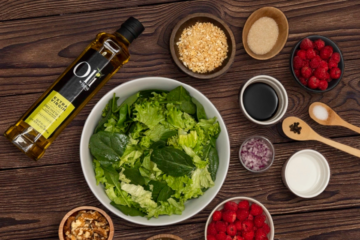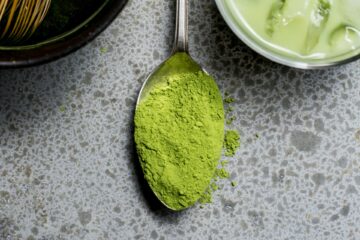When speaking of condiments that put the delish in delicious, sherry vinegar and red wine vinegar easily make their way into the conversation.
Although the above statement may suggest that sherry vinegar and red wine vinegar are not the same, we’re still going to say it for clarity. Sherry vinegar is not the same as red wine vinegar.
Even though these two delicious sour-tasting condiments differ, one can be used to replace the other.
So Is sherry vinegar the same as red wine vinegar? Before we dig deeper into their differences and uses, here’s a brief description of sherry vinegar and red wine vinegar.
Is sherry vinegar the same as red wine vinegar?
No, sherry vinegar and red wine vinegar are not the same. However, since both are kinds of wine vinegar, we understand why you think that.
In Spain, the Jerez people make Sherry vinegar from sherry wine, a flagship wine of the Jerez region in Spain.
Sherry wine comes from the fermentation of palomino fino grapes grown in Jerez or the sherry region of Spain.
Fermenting Sherry wine produces sherry vinegar using a unique blending and aging process known as the solera system.
The aftermath of this procedure, sherry vinegar, comes with a well-balanced dose of sweetness, nuttiness, and sourness. Although sherry vinegar has a vibrant flavor, we can’t describe its flavor as overpowering.
On the other hand, red wine vinegar is made from the fermentation of red wine till it turns sour. Acidic bacteria and a starter culture aid the fermentation. The endgame of this process is that the alcohol in the wine turns to acetic acid, a principal constituent of vinegar.
Red wine vinegar is one to brighten up your meals with its rich, tangy, and sour yet somewhat fruity flavor.
Mediterranean food enthusiasts adore this versatile condiment as it adds more excitement to Mediterranean-style cuisines.
Sherry vinegar vs. red wine vinegar – The primary differences
The sherry vinegar vs. red wine vinegar discourse is incomplete if we don’t acknowledge what sets them apart.
Here are some significant differences between sherry vinegar and red wine vinegar.
Where are they made?
Sherry vinegar is a flagship product of the Spanish region of Jerez.
Jerez, Spain, is the source region for the palomino fino grapes used to produce sherry wine. Although other brands make sherry vinegar, the quality is not as good as that produced in Jerez.
Meanwhile, red wine vinegar is not directly associated with any indigenous origin per se. Instead, it is more commonly associated with red wine production in general.
Who produces them?
Indigenous people in Jerez, Spain, produce sherry vinegar. Alternatively, several brands such as Napa Valley and Pompeian Gourmet are known to have quality red wine vinegar. You can make red wine vinegar at home as well.
How are they made?
The solera method is a unique technique used to ferment sherry wine into sherry vinegar. A more detailed explanation of solera is explained later on in this post. The fermentation of red wine using a starter culture and acidic bacteria results in red wine vinegar.
Taste
Sherry vinegar has a sweeter and softer taste than red wine vinegar.
Sherry vinegar’s characteristic flavor results from a well-defined mixture of sweetness, sourness, and nuttiness, while red wine vinegar has a somewhat sour, tangy, and fruity taste.
Read also: Chili Garlic Sauce Vs. Sriracha – The Main Difference.
Sherry vinegar vs. red wine vinegar – Use cases
Although you can use sherry vinegar instead of red wine vinegar, they shine better in specific meals.
Here are some meals you can add sherry vinegar and red wine vinegar to make them more vibrant.
Red wine vinegar
You can conveniently use red wine vinegar in bean and lentil soups, potatoes in potato salad, marinades, barbecue sauces, glazed potatoes, salad dressings, fried eggs, chicken. Red wine vinegar also pairs nicely with vegetables, pork, whitefish, shellfish, and beef (red meat).
Red wine vinegar is helpful for some housekeeping activities like cleaning out garbage disposals, cleaning fruits and vegetables, and killing unwanted weeds.
Apart from its flavorful and housekeeping benefits, red wine vinegar also has health benefits.
Here are some health benefits of red wine vinegar:
- Acetic acid and antioxidants help ward off bacterial skin infections and skin damage in red wine vinegar.
- The antioxidants in red wine vinegar also help stop cellular damage that can cause heart illnesses, cancers, and diabetes in the long run.
- Red wine vinegar helps in reducing blood sugar levels.
- Red wine vinegar helps with weight loss.
- Red wine vinegar reduces blood pressure.
- Red wine vinegar helps reduce blood clots, lowers blood cholesterol, and increases calcium absorption.
Sherry vinegar
Sherry vinegar adds its unique flavor to meals like Ajo Blanco and gazpacho. Adding sherry vinegar to chicken, steak, and vegetable marinades will enhance the taste.
A splash of sherry vinegar on tomato, lentil, and vegetable soups will give their flavors a brighter note. Sherry vinegar also pairs nicely with any vinaigrette.
A little bit of sherry vinegar in roasted foods like meat, vegetables, and fish would turn their tastes around.
Sherry vinegar also comes with some healthy attributes; here are some:
- • It aids weight loss.
- It helps reduce blood pressure and blood sugar.
- It helps ward off osteoporosis and infections.
- It helps increase liver function.
- Sherry wine increases HDL cholesterol which is a type of good fat.
- Helps ease indigestion and better calcium absorption.
Read also: Pigeon Peas Vs. Green Peas – The Differences.
How is sherry vinegar made? How best to use sherry vinegar?
Sherry vinegar comes from fermenting sherry wine in the southwestern Spanish region of Jerez, using a solera system.
The solera system comprises a pyramid of wooden barrels containing vinegar; the lower the level of the barrels, the older the vinegar. The bottom barrels hold the most aged vinegar, and the topmost barrels have the youngest vinegar.
When it’s time to bottle the sherry vinegar, not all the vinegar content in each barrel is bottled. Only 1/3rd of the vinegar content from each barrel is bottled.
Next, the younger vinegar from the barrels above fills up the space in the bottom barrels. Hence, the younger vinegar from the topmost barrels mixes with the older and more fermented vinegar.
This process gives sherry vinegar its uniquely blended sweet, sour, and woody taste.
It is best to use sherry vinegar in vinaigrettes, marinades, pan deglazing, glazing chicken and salmon, topping desserts, and cheese. Sherry vinegar can also enhance the taste of soups, casseroles, sauces, and stews.
Sherry vinegar can be drunk as a nutritious wine as well.
How Is Red Wine Vinegar Made? How Best To Use Red Wine Vinegar
The red wine vinegar process starts with fermenting red grapes into red wine.
A second fermentation process is what creates red wine vinegar.
Red wine is fermented with acidic bacteria and a starter culture until it becomes sour when producing red wine vinegar.
The best ways to use red wine vinegar are marinades, salads, soups, sauces, chicken, vegetables, pork, beef, and fish. In addition, red wine vinegar helps clean out garbage disposals, wash fruits and vegetables, and kill unwanted plants.
FAQs
No, red wine vinegar has a milder flavor than white wine vinegar.
White wine vinegar has a less fruity and more acidic flavor than red wine vinegar, which has a fruity and slightly tangy taste.
People prefer red wine vinegar for dark-colored foods, like darker vegetables, beef, and pork, and white wine vinegar for bright-colored dishes like chicken, light-colored vegetables, and fish.
Yes, you can use sherry vinegar in place of red wine vinegar.
A good substitute for red wine vinegar is sherry vinegar.
When alternating sherry vinegar with red wine vinegar, you should reduce extra sweeteners that come with your recipe because sherry vinegar has a sweeter flavor than red wine vinegar. If there are sweeteners like sugar in your recipe, it may cause the meal to be too sweet.
Hence, we recommend you reduce the amount of the sweetener in question, so your meal can accommodate the rich taste of sherry vinegar.




